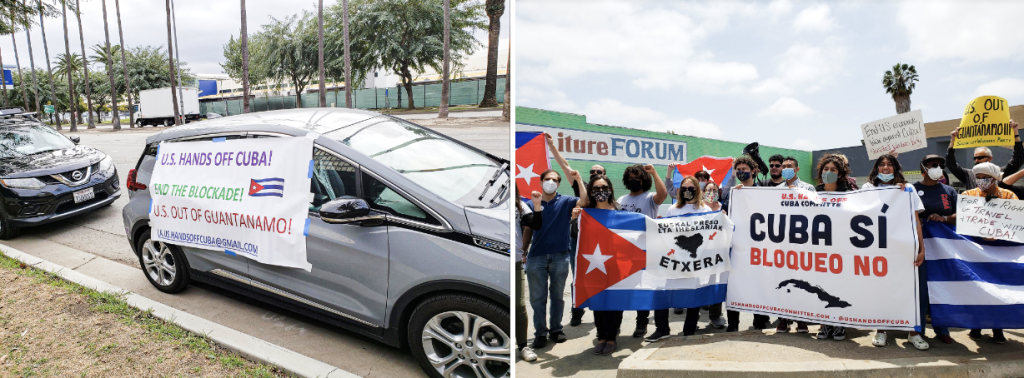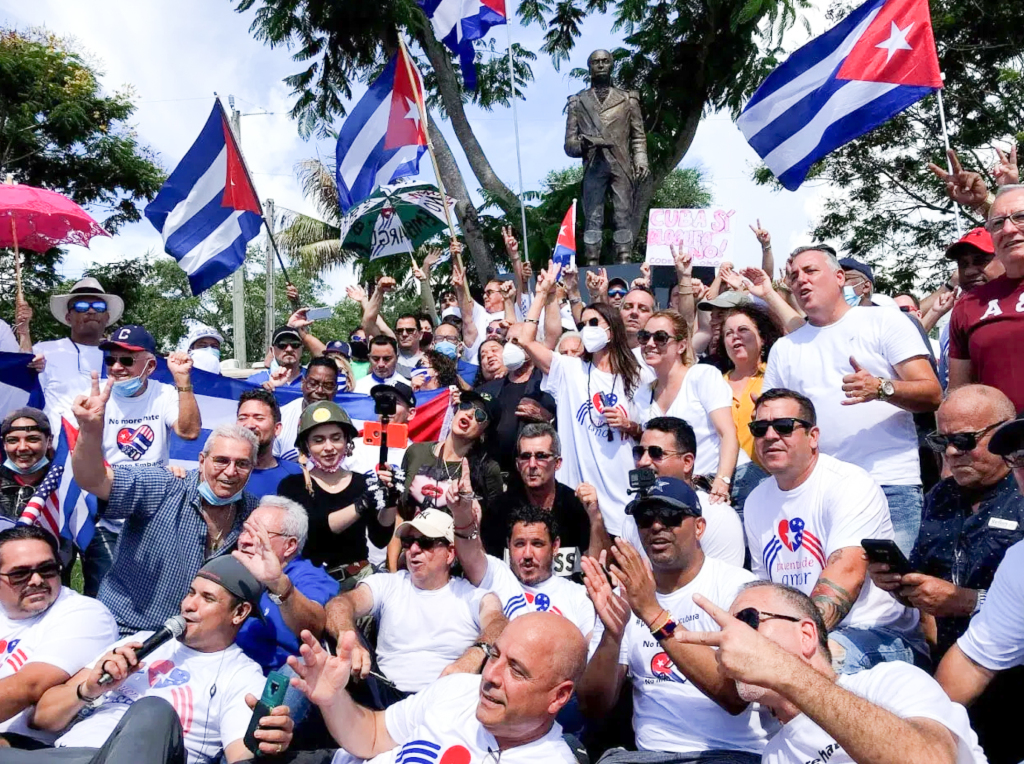BY WORLD-OUTLOOK.COM ON
By Mark Friedman and Brenda Lopez
LOS ANGELES, July 9, 2021—With flashers blinking and horns blaring, scores of bicycles and cars, plastered with signs and banners demanding an end to the U.S. blockade of Cuba, made their way through the streets of 70 cities in more than 25 countries on June 20. They were the latest of what have now become monthly and expanding protests around the world pushing for normalization of relations with Cuba and an end to Washington’s economic war.
Originally started in Miami nine months ago, the caravans have spread to two dozen U.S. cities. Years ago, the Cuban American groups Alianza Martiana and the Antonio Maceo Brigade organized anti-blockade caravans in Miami. But the recent caravans are substantially larger and are made up mostly of young people, predominantly Cuban-Americans.
Jorge Medina is the initiator of the Miami efforts. He is a YouTube personality who goes by the name El Proteston Cubano (The Cuban Protester). He has popularized the central message of these actions.
“We are Cubans that are against this cruel, unfair measure that our government, the United States government, has enacted against our island—against our families on the island, and because of that, we have raised our voices, our bodies, our legs, to demonstrate that in this city, we don’t all think alike,” Medina says in one of his videos.
‘What unites us is a love of the Cuban family’
“We have here different political tendencies. We’ve got leftists, centrists, right-wingers, we have all sorts of people here. We hope more people join us, to continue demonstrating—we are trying to show a principle—that in this city, there are many people that think differently, that do not agree with those measures…We are a movement of many different opinions. We don’t care if you are a Republican or a Democrat, a capitalist or a socialist, what unites us is a love of the Cuban family that drives us to demand an end to the blockade of Cuba, of policies that restrict our right to travel, to send remittances that help our families.”
Medina was originally inspired by Carlos Lazo, a Cuban American Iraq war veteran, now a teacher, who led a bicycle trip from Seattle to Washington, D.C., dubbed “Bridges of Love,” to end the U.S. embargo of Cuba.
Born in Cuba, Lazo crossed the Florida Straits on a raft 30 years ago at age 26. According to The Cuba Educational Travel website, Lazo had earlier spent a year in prison in Cuba. In the United States he joined the National Guard and was deployed to Iraq as a combat medic in Fallujah.
But Lazo was soon shocked, the website notes, when, “fresh off 7 months of life-threatening and soul-crushing service in Iraq, he was stopped from boarding an airplane to Havana to see his family as the result of newly-enacted Bush Administration laws that limited Cuban-Americans to one 2-week visit to the island every three years. No ifs, ands or buts. War hero? No importa. [It doesn’t matter.]”
Medina, who left Cuba 11 years after Lazo, also did some time in a Cuban prison.
As with most other Cuban immigrants, life in the United States turned out to be different from the myths that motivated them to emigrate in the first place. These Cuban Americans became students in the hard school of Uncle Sam University, graduating as people who not only saw their new country of residence in a different light, but also their homeland.
U.S. foreign policy is shaped by Washington’s hatred of Cuba’s socialist revolution and fear that its example would challenge U.S. domination in the Caribbean and Latin America. The U.S. economic war, now 60 years old, was recently escalated under the Trump administration with about 240 new sanctions. These include ending all remittances by Cuban Americans to their families on the island, banning most travel to Cuba, and attempting to prevent imported fuel supplies from reaching the Caribbean nation. Joe Biden, Trump’s successor, has so far refused to loosen, even mildly, any of these asphyxiating measures.
But now this bipartisan economic and political warfare waged under 12 consecutive U.S. presidents is encountering unexpected and loud resistance in a place no one would have ever thought to look: the streets of the quintessentially Cuban neighborhoods of Miami as well as among Cubans worldwide!
Any careful observer should not be surprised that the growing caravan movement would find its voice among newer generations of Cuban immigrants.
A right-wing mafia has been enabled, financed, and encouraged by administration after administration, which has turned a blind eye to ultra-rightist actions aimed at terrorizing opponents of this U.S. policy. Three months after Medina started his YouTube channel in August 2015 someone threw a Molotov cocktail at his car.
However, the myth of Miami as a unified bloc of political reaction and a hotbed of support for conservative or right-wing politicians has broken down.
The caravans organized across the United States are still relatively small but represent an expansion of the movement to end the US blockade of Cuba. The work to win new forces, to broaden the effort politically, and to involve larger numbers is still in the early stages. But with consistent outreach and clear political explanations larger actions can be organized, as they have been in other parts of the world.
Opposition to the embargo strongest among youth

The caravans reflect polarized and nearly evenly divided pro and con attitudes among Cubans in Miami, public opinion polls show.
According to the Miami Herald, “Opposition to the embargo is strongest among the youth, the second and third generation Cuban Americans and those who arrived in the United States after 1995.”
The relaxation of restrictions on travel and family remittances to Cuba under the Obama administration was extremely popular. “The number of U.S. citizens traveling to Cuba surged by 74 percent from 2015 to 2016,” the Miami Herald reported.
“Passengers arriving and departing for Cuba through MIA [Miami International Airport] reached nearly 1.2 million [in 2016], compared to 907,263 in 2015,” said Josefina Vidal, Cuba’s chief negotiator in talks with the United States at the time.
Also popular were Obama administration rules that allowed Cubans living in the United States to more freely send money to their families on the island. Claiming that these remittances were being pocketed by companies run by the Cuban military, the Trump administration shut them down. “We are talking about $3.7 billion a year that the military manages at will,” Emilio Morales of the Havana Consulting Group told the Miami Herald. No evidence was presented to back up this claim.
The new sanctions imposed under Trump aimed at upending the Obama-era policies and were very unpopular. For most of the half million Cubans living in the United States they were felt as painful and personal blows against their right to travel to see and help their families. Previously allowed remittances were discontinued, cruises were halted, airplane flights severely reduced, all Western Union offices in Cuba were ordered shut down, and the U.S. embassy staff in Havana was so reduced that denying visas to Cubans seeking to travel to the United States became commonplace.
The impact of the Covid-19 pandemic is also a factor. Despite the brutal blockade that actively targets Cuba’s health care system by challenging the country’s ability to acquire medical supplies and equipment and sustain its public health infrastructure, Cuba has limited the spread of the virus, reduced the human toll of the pandemic, and maintained its medical assistance to nations around the world.
Cuba has among the lowest rate of pandemic-related infections and deaths in the world. A person who gets sick with the coronavirus in Miami-Dade County is twice as likely to die than in Cuba! In the Los Angeles metropolitan area, which has the same population as all of Cuba, 24,500 people have died from Covid-19, while Cuba had seen less than 1,400 deaths by the end of June 2021. Of those, about 900 occurred since March after Havana re-opened the country’s doors to returning Cubans and international travelers
Cuba has developed five anti-Covid vaccines—an amazing feat for a tiny country of 11 million people—two of which recently passed phase-three trials and are currently being used to inoculate millions of Cubans. Cuban officials have said they plan to waive patents and distribute these vaccines cheaply to other developing nations that don’t have the resources to compete in the world market for the medicines distributed by the pharmaceutical monopolies of the imperialist world.
For months, the United States, which holds patents to several vaccines, refused to share the formulas with the World Health Organization so the vaccines could be produced cheaply in other countries. Thousands have died and thousands more will perish because of such capitalist “intellectual property” rights. This stands in stark contrast to the development in the 1950s of the polio vaccine by U.S. virologist Jonas Salk who gave it free to the world.
The demand to end the blockade meshes with the urgent need to begin medical collaboration with Cuba, a nation that is selflessly sharing its expertise and skilled medical personnel with the world.
It is within this set of material facts that the caravanistas have begun to develop their own process of decision making, conduct media and outreach work, and organize defense against rightist provocations like those that took place in May and June in Miami.
During those actions the rightists used an anti-communist radio program to build a counter caravan, at the same assembly point, as a provocation. Yet they could only muster 40 people versus the 200 people on bicycles and in cars taking part in the anti-blockade caravan. The anti-embargo caravanistas carried out their protests successfully without being drawn into a confrontation.
At the same time, the Saving Lives Campaign, initiated by Cuban solidarity activists, doctors, and others launched an effort to raise money to send millions of syringes to Cuba, which has the vaccines but lacks enough syringes to inject them. This is the most important material aid campaign for Cuba, and the most successful on an international scale. In the United States $500,000 has already been raised at caravans and through fund appeals across the country, and the campaign is now sending 6 million syringes to Cuba—30% of the 20 million the country needs.
Pilgrimage of Cuban Americans to Washington, D.C.
On June 27, a caravan of Cuban Americans started a 1,250-mile pilgrimage from Miami to Washington, D.C. Organizers plan to present the Biden administration with tens of thousands of petitions from people across the country demanding an end to the blockade and a recognition of the recent United Nations 184-2 vote calling on the United States to lift its criminal embargo against Cuba. Caravans, cars, and buses will converge in D.C. July Carlos Lazo has been speaking publicly and giving media interviews to promote this caravan. He has also been meeting with community groups working on local issues to make new allies, such as with Willie Head, who is part of an organization of Black farmers who have visited Cuba. Along the way in Jacksonville, Atlanta, and elsewhere, Lazo and other caravanistas have been asking people to sign petitions and write messages to take to the White House.
In a statement about this effort Lazo had this to say:
“Hundreds of Cuban-Americans and Americans have worked tirelessly calling for the lifting of those sanctions that punish the Cuban family inside and outside the Island. Millions of Cubans and people of good will around the world have clamored for the people of Cuba to be treated humanely. “It has been a frustrating and agonizing wait. While Biden, still hesitant, hesitates to deliver what he promised during his election campaign, our families have suffered and are suffering the punishment of economic sanctions. With the pandemic, the dire effect of these measures has been compounded daily. Every day we receive news of our families, of the calamities, of the lack of food and medicine on the Island; of the pain and suffering caused by the embargo. “For the first time, people of diverse faiths and ideologies are battling daily in Miami—and in many other cities in the United States and the world—for the lifting of sanctions against Cuba. That will is expressed in the thousands who march in caravans, month after month, asking for the end of the blockade. They have been the architects of this wave of love. All together they have made it possible for this clamor to reach the White House.” Carlos Lazo statement
Scores of city councils, labor boards, and other civic bodies representing more than 30 million people nationally have condemned Washington’s blockade.
So far, more than 80 members of Congress have sent a similar message to Biden.
The June convention of the International Longshoremen’s Union (ILWU) set an important example in adopting a resolution demanding an end to all anti-Cuba sanctions and donating $10,000 to the “Syringes for Cuba” campaign. The ILWU resolution read in part:
“Therefore be it Resolved that this Convention calls on the Biden administration to vote FOR this Resolution to end the U.S. unilateral extraterritorial embargo of Cuba and act swiftly to remove Cuba from the spurious US list of state sponsors of terrorism, reset Cuba regulations to January 1, 2017, and continue the respectful discussion to fully normalize US-Cuba relations, and that this Resolution be distributed to Congressional delegations, the news media, and all labor organizations urging them to do the same.”ILWU resolution
While such efforts are expanding, much more pressure is needed to win even a partial lifting of the U.S. government’s punitive measures against Cuba. The July 25 action in DC and nationwide solidarity protests are opportunities to build the anti-embargo movement and make our presence known to Biden, Congress and others in Washington, D.C., and beyond.
JOIN THE WASHINGTON JULY 25TH CARAVAN!
ASSEMBLY: 12:30 on H St between 17 St and Connecticut NW
RALLY: Lafayette Park in front of White House 2-4 PM
PARTICIPATE IN NATIONWIDE ACTIONS IN A CITY NEAR YOU!
To join the actions, connect with the National Network on Cuba: http://nnoc.info/
or US-Cuba Normalization Committee: https://www.us-cubanormalization.org/viva-cuba/
CONTRIBUTE TO SYRINGES FOR CUBA CAMPAIGN!
To donate to the syringes campaign, go to: www.ghpartners.org/syringes4cuba

